About the work of Athanasius Fet
Afanasy Afanasyevich Fet is a famous Russian poet with German roots,lyricist,translator, author of memoirs. Corresponding Member of the Academy of Sciences of St. Petersburg
In the Oryol province, not far from the city of Mtsensk, in the 19th century, the Novoselki estate was located, where on December 5, 1820, in the house of a wealthy landowner Shenshin, a young woman, Charlotte-Elizabeth Bekker Fet, gave birth to a boy, Athanasius.
Charlotte Elisabeth was a Lutheran, lived in Germany and was married to Johann-Peter-Karl-Wilhelm Feth, an assessor at the Darmstadt city court. They got married in 1818, the girl Caroline-Charlotte-Dahlia-Ernestine was born in the family. And in 1820, Charlotte-Elizaveta Becker Fet left her little daughter and husband and left for Russia with Afanasy Neofitovich Shenshin, being seven months pregnant.
In the pastures of the dumb I love in the crackling frost
In the light of the sun, the brilliance of the sun is prickly,
Forests under hats or in gray hoarfrost
Yes, the river is sonorous under dark blue ice.
How they like to find thoughtful eyes
Winded ditches, winded mountains,
Sleepy blades of grass among the bare fields,
Where the hill is bizarre, like some kind of mausoleum,
Sculpted at midnight - or clouds of distant whirlwinds
On white shores and mirror polynyas.
Afanasy Neofitovich was a retired captain. During a trip abroad, he fell in love with the Lutheran Charlotte Elizabeth and married her. But since the Orthodox wedding ceremony was not performed, this marriage was considered legal only in Germany, and in Russia it was declared invalid. In 1822, the woman converted to Orthodoxy, becoming known as Elizaveta Petrovna Fet, and soon they married the landowner Shenshin.
When the boy was 14 years old, the Oryol provincial authorities discovered that Athanasius was registered with the surname Shenshin earlier than his mother.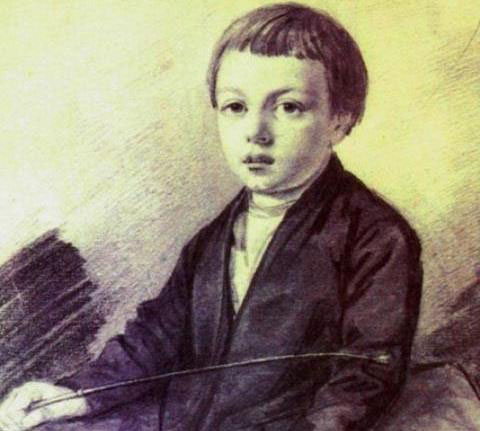 I got married to my stepfather. In this regard, the guy was deprived of his surname and title of nobility. This hurt the teenager so deeply, because in an instant he turned from a rich heir into a nameless person, and then he suffered all his life because of his dual position.
I got married to my stepfather. In this regard, the guy was deprived of his surname and title of nobility. This hurt the teenager so deeply, because in an instant he turned from a rich heir into a nameless person, and then he suffered all his life because of his dual position.
From that time on, he bore the surname Fet, as the son of a foreigner unknown to him. Athanasius took this as a shame, and he had an obsession,which became decisive in his life path - to return the lost surname.
Athanasius received an excellent education. A capable boy was easy to study. In 1837 he graduated from a private German boarding school in Verro, Estonia. Even then, Fet began to write poetry, showed interest in literature and classical philology. After school, in order to prepare for entering the university, he studied at the boarding house of Professor Pogodin, a writer, historian and journalist. In 1838, Afanasy Fet entered the law department, and then - the philosophical faculty of Moscow University, where he studied at the historical and philological (verbal) department.
wonderful picture,
How are you related to me?
white plain,
Full moon,
the light of the heavens above,
And shining snow
And distant sleigh
Lonely run.
At the university, Athanasius became close to the student Apollon Grigoriev, who was also fond of poetry. Together they began to attend a circle of students who were intensively engaged in philosophy and literature. With the participation of Grigoriev, Fet released his first collection of poems "Lyrical Pantheon". The creativity of the young student earned Belinsky's approval. And Gogol spoke of him as "an undoubted talent." This became a kind of "blessing" and inspired Afanasy Fet to further work. In 1842, his poems were published in many publications, including the popular journals Otechestvennye Zapiski and Moskvityanin. In 1844, Fet graduated from the university.
Spruce covered the path with my sleeve.
Wind. In the forest alone
Noisy, and creepy, and sad, and fun -
I do not understand anything.
Wind. All around is buzzing and swaying,
Leaves swirl at your feet.
Chu, there is suddenly heard in the distance
Subtly calling horn.
Sweet call to me herald copper!
Dead sheets to me!
It seems that the poor wanderer came from afar
You warmly greet.
After graduating from the university, Fet entered the army, he needed this in order to regain his title of nobility. He ended up in one of the southern regiments, from there he was sent to the Lancers Guards Regiment. And in 1854 he was transferred to the Baltic regiment (he later described this period of service in his memoirs "My Memoirs").
In 1858, Fet finished his service as a captain and settled in Moscow.
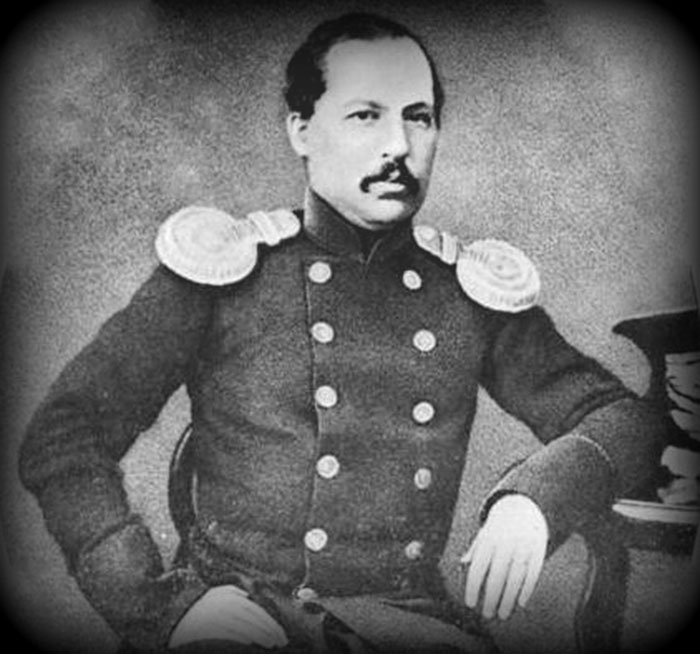
In 1850, the second book of poems was published.Feta, which was already positively criticized in the Sovremennik magazine, some even admired his work. After this collection, the author was received among famous Russian writers, which included Druzhinin, Nekrasov, Botkin, Turgenev. Literary earnings improved the financial situation of Fet, and he went to travel abroad.
In the poems of Afanasy Afanasyevich Fet, three main lines were clearly traced - love, art, nature. The following collections of his poems were published in 1856 (under the editorship of I. S. Turgenev) and in 1863 (immediately a two-volume collected works).
Despite the fact that Fet was a sophisticated lyricist, he managed to perfectly manage economic affairs, buy and sell estates, making a fortune.
In 1860, Afanasy Fet bought the Stepanovka farm, became the owner, lived there all the time, only briefly appearing in Moscow in winter.
In 1877, Fet bought the Vorobyovka estate in the Kursk province. At 18![]() 8
1 he bought a house in Moscow, he came to Vorobyovka only for summer vacations. He again took up creativity, wrote memoirs, translated, released another lyrical collection of poems "Evening Lights".
8
1 he bought a house in Moscow, he came to Vorobyovka only for summer vacations. He again took up creativity, wrote memoirs, translated, released another lyrical collection of poems "Evening Lights".
Afanasy Afanasyevich Fet left a significant mark on Russian literature. In the first verses, Fet sang the beauty of nature, wrote a lot about love. Even then, a characteristic feature appeared in his work - Fet spoke about important and eternal concepts in hints, knew how to convey the subtlest shades of mood, awakening pure and bright emotions in readers.
After the tragic deathsweetheartMaria Lazich Fet dedicated the poem "Talisman" to her. It is assumed that all subsequent poems by Fet about love are dedicated to her. In 1850 a second collection of his poems was published. It aroused the interest of critics, who did not skimp on positive reviews. Then Fet was recognized as one of the best contemporary poets.
The night shone. The garden was full of moonlight. lay
Beams at our feet in a living room with no lights.
The piano was all open, and the strings in it were trembling,
Like our hearts for your song.
You sang until dawn, exhausted in tears,
That you are alone - love, that there is no other love,
And so I wanted to live, so that, without dropping a sound,
Love you, hug and cry over you.
And many years have passed, languid and boring,
And in the silence of the night I hear your voice again,
And blows, as then, in these sonorous sighs,
That you are alone - all life, that you are alone - love.
That there are no insults of fate and hearts of burning flour,
And life has no end, and there is no other goal,
As soon as you believe in sobbing sounds,
Love you, hug and cry over you!
Afanasy Fet remained a staunch conservative and monarchist until the end of his life. In 1856 he published a third collection of poems. Fet sang beauty, considering it the only goal of creativity.
In 1863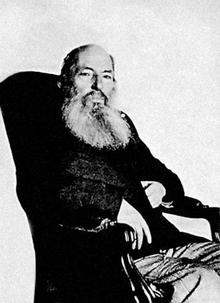 the poet published a two-volume collection of poems, and then a twenty-year break came in his work.
the poet published a two-volume collection of poems, and then a twenty-year break came in his work.
Only after the surname of his stepfather and the privileges of a hereditary nobleman was returned to the poet, he took up creativity with renewed vigor.
Towards the end of his life, Afanasy Fet's poems became more philosophical. The poet wrote about the unity of man and the universe, about the highest reality, about eternity. In the period from 1883 to 1891 Fet wrote more than three hundred poems, they were included in the collection "Evening Lights". The poet published four editions of the collection, and the fifth came out after his death. With a thoughtful smile on his forehead.
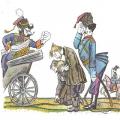 “Lefty” - a summary of the work N
“Lefty” - a summary of the work N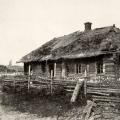 Turgenev, "Biryuk": a summary
Turgenev, "Biryuk": a summary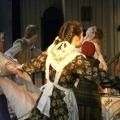 Comedy A.N. Ostrovsky "Poverty is not a vice": a summary of the work
Comedy A.N. Ostrovsky "Poverty is not a vice": a summary of the work